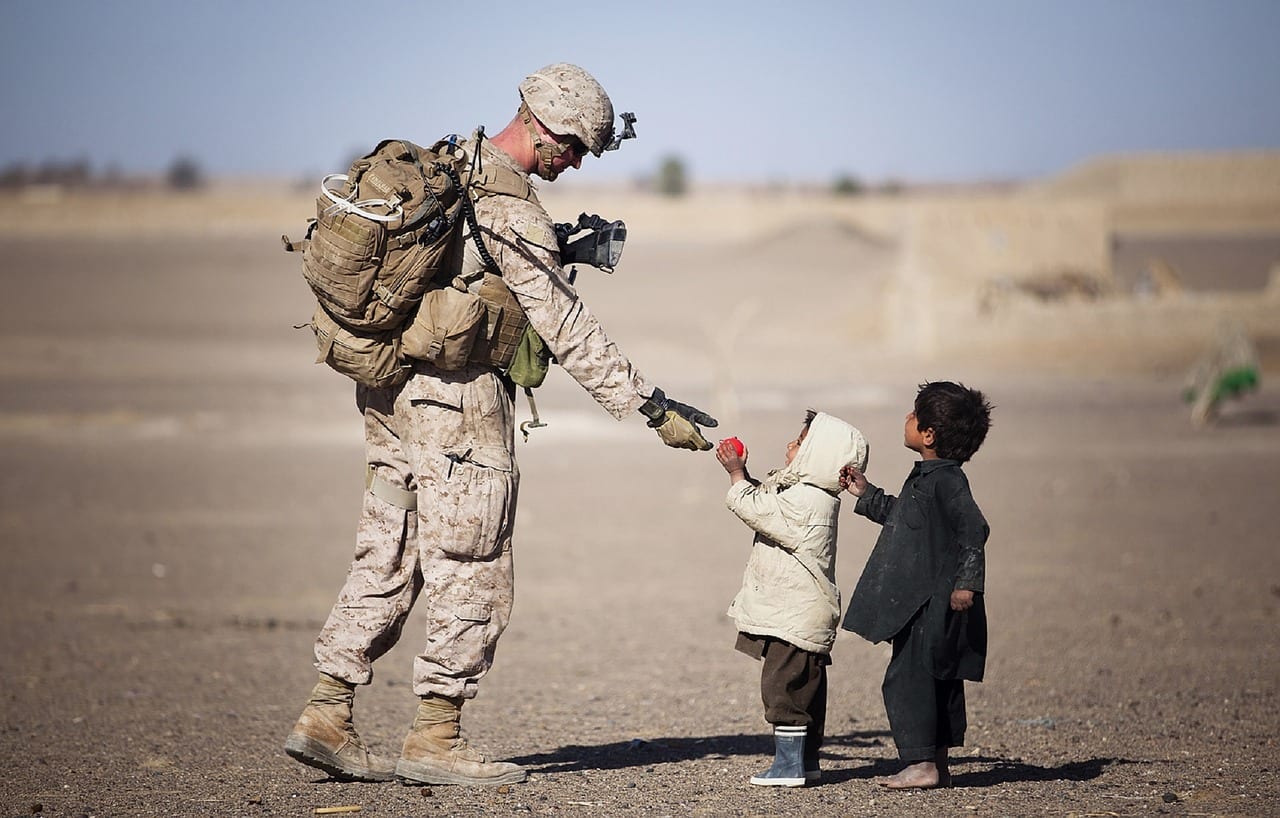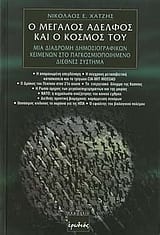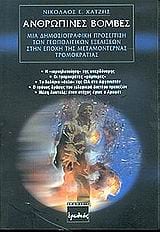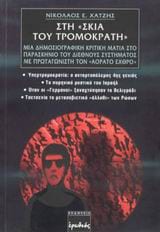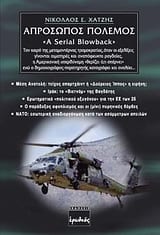The Big Brother and his World
Published by Erodios Editions, Thessaloniki: May 2001
A brief statement of the book’s summary:
Geopolitics: The U.S. military operations in the Persian Gulf (1990-1991) signaled the beginning of a new era in the international, diplomatic, geopolitical and defense developments, under the «New International Order». / Nikos Chatzis
Additionally, mass media technology evolution introduced the «cosmos» to the idea of «Global Village».
A decade later, the Soviet Union’s absence from the international scene contributes to the uncertainty of the new global environment, and the (newborn) Russian Federation suffers from (chronic) economic instability.
On the other hand, the United States is the only super power as the international peace-maker that yields to the fear of human losses, a decisive factor to the implementation of multinational peace missions.
Preventive diplomacy remains a serious challenge for the Department of State and the selective use of military power, supporting America’s national interests, is the cornerstone of the «Powell Doctrine» to U.S. foreign policy.
CIA’s «diplomatic face» in the Middle East, China’s Dragon in the 21st century, Iran and oil politics in the Caspian basin, NATO’s future challenges, the liberation of international defense industry, the limits of conventional war, and the Russian strategic dilemma towards NATO, are some of the topics presented in detail in that book, introducing the reader to the secrets of the (globalized) international system.
«Global Village»: a geopolitical «theater play» with distinguished roles for protagonists and second roles for the international system’s «followers».
The first role is given to the only super power: «The Big Brother», as the ambition of unilaterally supporting American interests outside the U.S., drives Washington to a paradoxical relationship between isolation and intervention with the rest of the world.
Human Bombs
Published by Erodios Editions, Thessaloniki: April 2002
A series of questions describing the book’s content:
-How could someone define terror and its motives?
-Does terror constitute the most effective «weapon» in the hands of the poor (weak) social groups?
-Terror, social inequalities, human rights and injustice: the excuse
-Is terror a solution to political and diplomatic deadlocks?
-Terror, decision-making centers and controversial interests: wrong choices
-Can we see post-modern terror as the «medium» for spreading globalization’s ideas and practices?
-Fanaticism as the «opium» of the (modern) terrorist, an obedient organ of secret interests
-Terrorist: the ultimate weapon against innocent people
-Operation Afghanistan: Osama bin Laden, Taliban and the Super Power (a lethal combination)
-Liberation struggles and terror justifications
-The enigma of personalized terror
-Is terror by «human bombs» Russia’s alibi in Chechnya?
-Terror as «pretense» to human rights restrictions
-Someone must pay for the innocents’ blood
The Terrorist’s Shadow
Published by Erodios Editions, Thessaloniki: August 2002
A brief statement of the book’s summary:
September 11, 2001, Washington. Midnight. Fifteen hours after the tragic terrorist attack against the Pentagon, residents of the American center -where important decisions for the rest of the world are taken- experience one of the most horrible modern nightmares: the fear of the next terrorist’s «attack» and its unpredictable consequences.
Signs of the times are cursed, by the «transformation» of humans into «bombs» and the rapid changes catapulting international developments, following the terrorist attacks against New York and Washington.
The Terrorist’s Shadow on the relations between different member-nations of the international community is a (new) global reality. The so-called «axis of evil» constitutes the epicenter of America’s war against terror. The new situation has a multiple geopolitical consequences, as Washington searches for determination and rapid action, between loyal friends and elusive foes.
The Taliban movement is merely history in Afghanistan, although the multinational search for al Qaeda members is ongoing. The antiterrorist fight has started in the Philippines. The situation in the Middle East is destabilizing. American military advisers were deployed in Georgia. India and Pakistan engaged in dangerous war confrontations with New Delhi blaming Pakistan-based militants.
The trial of Slobodan Milosevic at the International War Crime Tribunal in Hague continues… Yugoslavia has ceased to exist. Serbs and Albanians have tried to live together in Kosovo, but ethnic problems remain. The modern terror is a dangerous reality. President Bush presented his plan to create a vast homeland security department, protecting installations with special strategic interest, from U.S. airports to water treatment plants.
In the core of Washington’s anti-terror strategy, the American (conventional) defense machine is structured by precision weapons, unmanned aerial vehicles, rapid response technology and the advantages of the current military revolution.
Also the development of the limited National Missile Defense program continues, in spite of the «static» character of the system. Think tanks in Washington and elsewhere in the world, point out that American diplomacy must generally avoid pinprick measures that aren’t strategically effective.
Is Iraq the next target for a massive American (multinational?) military operation?
What about possible collateral damages?
Asymmetric war and its unpredictable consequences caused by a flexible and «shadowy» terrorist, demand cautious and simultaneously smart decisions.
The carnage in New York and Washington is a tragic fact; could it be an alibi or a decisive geopolitical challenge to American strategic thinkers?
The Palace of Telos
Published by Erodios Editions, Thessaloniki: October 2003
A brief statement of the book’s content:
«The uncertainty of the current international developments through the prism of a combined, analytical, creative, but journalistic approach…»
Palace of Telos: a prison of torture outside Saddam’s Baghdad
The «Knights of the Red Cross» and the old preventive war: a historical dilemma in 15th century’s Jerusalem.
The roots of ethnic and religious differences between North and South in today’s Iraq: Mesopotamia at the crossroads of history and prehistory.
Iraq: the «apple of discord» between Britain and Germany.
Gamal Abdel Nasser: Arabic National Socialism, the revenge.
Iran-Iraq: eight years of war – the bloody reemergence of the ancient Persian – Arab conflict.
Middle East: a real geopolitical challenge for the «American» America.
The lesson of Afghanistan: an «orthodox war» of precise weapons and special operations units.
MegaNATO and the strategic space: the «weaponising» of space and the challenge of microsatellites.
Research in current defense technology: skepticism about the chasm between the U.S. and Europe.
The lethal gas… of salvation: Moscow late October 2002.
Faceless War: «A Serial Blowback»
Published by Erodios Editions, Thessaloniki, March 2005
«In the epoch of post-modern terrorism, when the developments are bloody and inevitably abrupt, the American superpower «reaps what it sows» and the journalist-observer reports and analyses…»
A brief Summary Book:
-«Serial Blowback»: sequential consequences in faceless war
-The new «Berlin’s Wall» in the West Bank
-Is it peace, a «Trojan Horse» in the Palestinian problem?
-The unpredictable guerrilla war in Iraq: the players
-Iran: a broken piece of the «made in USA» puzzle in the Middle East
-China-India, the U.S.-North Korea: scenarios for geopolitical consideration in Southeast Asia
-North Africa: Ronald Reagan’s «mad dog» (Muammar Gadhafi) and Libya’s new geopolitical realities
-Turkey: Prime Minister Recep Tayyip Erdogan’s political «headaches» and European challenges
-Central Asia, Afghanistan: NATO is…here
-Southeastern Europe and the Balkans: «obstacles» in the path of long desired European orientation
-The EU of 25: questions about Brussels, its «political distance» and a «tiger» from the Baltic Sea (Lithuania)
-Strategic Nuclear Arms: the paradoxical disarmament and the mini nuclear bombs
